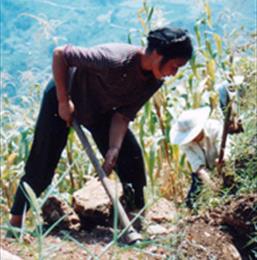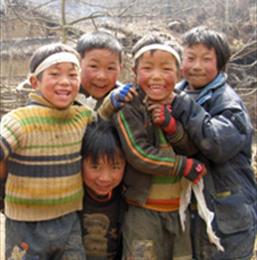Water Supply and Foundational Infrastructure
Many of the poorest villages in Hanyuan and Ganluo Counties have problems due to a lack of adequate drinking or irrigation water. DORS has been implementing water supply and irrigation projects since 1997, for details click on the links to the right.
Establishing Foundational Infrastructure
From 1997 to today, with the support of several different organizations, DORS has implemented basic infrastructure projects in 33 villages in Hanyuan and Ganluo counties. Basic infrastructure projects form the foundation for other development projects. Those that we have done include: Water projects (irrigation, drinking water and water for watering livestock); electricity projects (generators, transformers [after the government began initiating transformers on a large scale, we have done this project less and less]); roads and bridges projects (roads, paths, small vehicle bridges and footbridges), etc.
Water Needs
Water projects are the first projects DORS implemented (and still is implementing today). In the villages where we have completed water projects, some didn’t even have an old system of pipes, so in order to use water villagers had to walk a long distance and carry it. Usually the water source was outside and exposed, and extremely unsanitary. So DORS decided to help villagers solve the problem.
As of March 2007, DORS had done water projects in 22 villages, solving the drinking water and irrigation water problem for 13140 villagers. Doing water projects altogether expended 1,346,184 yuan, of which DORS contributed 1,320,843 yuan and villagers 20,341 yuan, and the government 5000 yuan.
Project Effectiveness
The establishment of water systems has changed the water-carrying history of these villagers, which has lasted for years upon years. Villagers don’t need to walk tens of minutes to an hour on mountain paths to fetch water home to drink, but rather can drink clean, sanitary running water from taps directly at home. The portion of the villagers who had running water systems previously but which fell into disrepair, now don’t have to worry about leaking/broken pipes, which influences whether the water supply is sufficient to use or not.
The establishment of repair and maintenance systems for the water projects: Villagers have already started to value the post-project maintenance stage. Usually a villager in charge of maintenance will be chosen, who will receive the maintenance fees from the users, and implement professional maintenance.
Electricity
DORS does electricity projects somewhat less than water projects. The reason is that the government has done a large work connecting many villages to the existing electricity grid, through the “Nong Wang Gai Zao” program. Up to March 2007 DORS has implemented 13 villages’ electricity projects. Through the projects, 1,795 villagers can now light their homes. Our electricity projects have cost 301,755 yuan all together, with DORS contributing 187,567 yuan and villagers contributing 24,298 yuan, the government 89,890 yuan.
Project Effectiveness
Helping villagers connect to electricity completely changes their living conditions. Electricity is the foundation for slowing raising living standards—villagers can then gradually acquire electrical appliances, and gradually put in energy towards income-increasing projects.
Roads and Bridges
Because roads and bridges require very large investments, DORS usually only does small-scale village level road construction and repair, including village paths and small bridges. Up to March 2007, DORS has done 10 village roads, spending 295,286 yuan; in four villages we have implemented cement paths to households projects, spending 48,449 yuan; in 3 villages built 3 bridges, spending 33,469 yuan, of which Chalin village’s road-bridge was rather large-scale, and received strong support from the government. This project spent 136,840 yuan, with the government contributing 106,475 yuan, villagers contributing 2,258 yuan, and DORS contributing 28,107 yuan. Altogether 669 villagers benefited.
Project Effectiveness
Villagers believe the benefit of roads and bridges being passable is that it is then more convenient for traders to come and go, and villagers themselves to get goods to market. This is an essential prerequisite for development. Many villagers also wait to repair their houses or animal sties until the roads are passable and materials can be transported in by car. Everyone believes with roads, conditions in the villages will gradually improve, plus it will create wealth for future generations. As buying and selling becomes convenient, families’ finances improve, they can buy a motorcycle, and “things will gradually get better.” Villagers can be funny: In one of our project villages, Daying, after making the road passable, a villager excitedly told us, “With the road, it will be easier to get a wife!”
Through the project, the villagers become more aware of the importance of having a management system, for example: how to divide the labor, a rewards and consequences system for contributing or not as agreed, etc.
Of all the infrastructure projects, the water project implemented in 1998 in Banyang Village is a special example. Banyang Village is located in the upper reaches of the Dadu River, and in order to obtain drinking water, villagers had to cross the wide river and fetch water from the opposite side, so the difficulty of doing this project can be imagined. But villagers and us completed this project together—a flexible pipe strung across the 800 meters of open air between the two banks of the Dadu River. The local villagers named the project “open air drinking water.” Following this, DORS developed a series of other basic infrastructure projects for meeting villagers’ needs. In the beginning, water and electricity projects were the main ones. In 1998 we did a micro-hydropower project in Banyang Village. Afterwards, the project was expanded to roads to and between households as well as the main roads to the village and its hamlets that bring economic benefit. Usually, as mentioned above, because our funds are very limited, we can’t support the whole cost of a main road project, and so our usefulness is only to be “an actor’s opening words.” For example, in Maping village, one of our project villages, villagers’ desire for a road is extremely strong. We invested 50,000 yuan to support them building this road, and naturally our contribution was far too small, so the rest required government departments’ investment. The important part is that we started the chain, and villagers tell us, “The money you gave us was too little, but if it weren’t for that money, this road’s completion would be delayed about two years.” Now this road is already over half completed, and the local government contributed the majority of the manual labor, machine labor, and funds, acquiring funding support from the Transportation Bureau. With the addition of the villagers’ active investment of labor, the hardships involved in having just one party supporting the project have been reduced considerably.


